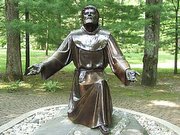5th Glorious Mystery: The Coronation of Our Lady in Heaven (Mary)
Never will I forget the days of my youth, of the laughter around the well as my mother drew water or chatted with her friends. It was a task that was soon to be my own for no household can survive without water and those brief moments in the middle of the village are the precious times for all women. They are the opportunities for a short rest from the daily routine of caring for the house and family, an occasion to meet friends, exchange news and share a lifetime of togetherness, for every woman knows every other woman in a small village such as Nazareth. Our lives are inextricably entwined. That is why village life is a wonderful strength and support, but when something goes wrong, the gossip can be unending and unendurable.
I felt great sorrow for my mother in that brief period before Joseph and I married. The women could see that I was pregnant, but if it was something that my mother had found hard to accept at first, so did the people in the village. There was the inevitable gossip. There were the snide comments that both my mother and I found hurtful. After all, neither of us could say what had happened. I could not tell the world that I had been visited by an angel. Joseph could not face the menfolk of Nazareth, telling them that he was not the father of my baby. I would have been stoned to death as an adulterer because, as Joseph and I were already betrothed, we were as solemnly bound to each other as if we were married.
Life became easier once Joseph and I were married. People then presumed that my baby was also his. The gossip soon died away as we lived the life of an ordinary married couple, with me looking after the house and Joseph continuing his work as a carpenter.
…and then Jesus came along. Yes, the journey to Bethlehem was difficult, especially as I went into labour and gave birth to Jesus in a stable, but the innkeeper’s wife was very kind to us whilst we were there. Even as we escaped into Egypt, knowing that we were trying to escape from Herod, as we passed by the inn, she ran out, pressing food into Joseph’s hand.
Joseph and I were happy to return to Nazareth from Egypt. By then, Jesus was walking. He was such a happy child, a real treasure. We loved watching him take his first steps, stumble and fall, and then pick himself up again. Yes, there were tears if he hurt himself, but what toddler learns to walk without a few bumps and bruises?
It was not long before Jesus was a boy, playing with his friends, accompanying us to the synagogue, ‘helping’ Joseph in his workshop, finding countless ways to satisfy his lively intelligence and abundant energy.
Then Joseph died. Jesus became the head of the household and so it was his job to lead the mourning for the man who had been everything that a father should have been to him. Nobody would ever have known that Joseph was not the father of Jesus. He was such a caring, loving, wonderful, man. We loved him so much. I thought I would never come to terms with not having him at my side…
I had always known that Jesus would grow to manhood and would move away from Nazareth, following the path that his Father had chosen for him. My life was often lonely in his absence, especially when I heard of both, the joys and the sorrows of those three years. I cannot begin to describe what his arrest, crucifixion and death meant to me, cannot begin to express the agony of that day, an agony that left a lasting mark even when I had seen him after his resurrection.
…and now, Jesus and I are together again, forever. Joseph and I are together again, forever. Heaven is togetherness.
God bless,
Sr. Janet















